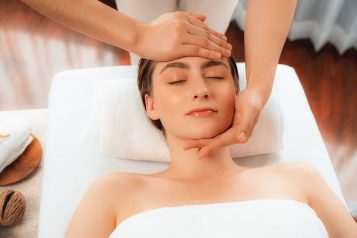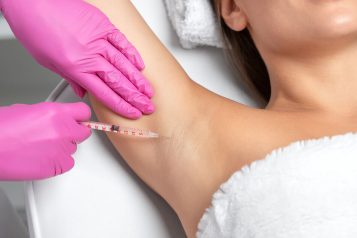Sun protection is a fundamental aspect of skincare. Yet, its importance is magnified when preparing for and recovering from both invasive and non-invasive cosmetic procedures, especially during the summer season. Whether you’re considering a facelift, laser treatment, or injectable fillers, shielding your skin from harmful UV rays can significantly impact the effectiveness and longevity of your results. Our Haute Beauty experts share why proper sun care is essential during these sunny months—not only for optimal healing but also to prevent complications such as pigmentation changes, scarring, and accelerated aging. Understanding and implementing rigorous sun protection measures is key to achieving and maintaining the best possible outcome from your cosmetic enhancements, ensuring your skin stays healthy and radiant all summer long.
Dr. Jose Rodríguez-Feliz | Eyelid Surgery & Face | Miami, FL
Sun damage has the most significant impact on skin aging. Along with laxity and volume loss (fat and bone), it is a primary factor in the changes we associate with aging.
Prevention is always better than correction. Unfortunately, sun damage is cumulative, and most exposure occurs early in life, when people are not thinking about aging or the potential risk for skin cancer. Fortunately, awareness is increasing, and this mindset is starting to change.
A vitamin C antioxidant and sunblock are the two most important products for sun protection. We always recommend that patients develop habits to minimize sun exposure, including wearing appropriate clothing with SPF and accessories such as hats and sunglasses.
After treatment, the main concern is hyperpigmentation. Many skin resurfacing procedures, especially those involving ablation or stimulation of the superficial skin layers, can activate melanocytes, leading to post-inflammatory hyperpigmentation. Therefore, it is essential to prepare the skin before such treatments and protect it for four weeks afterward.
For more information, visit Dr. Rodríguez-Feliz's website, Instagram, or Facebook!
Dr. Kiran Mian, Hudson Dermatology and Laser Surgery | Skin | New York, NY
Sun protection is imperative when healing from both invasive and noninvasive cosmetic procedures. During cosmetic procedures, we create controlled inflammation to stimulate healing and boost collagen production. Any time there is inflammation, there is a chance of hyperpigmentation. UV rays trigger melanin production. Sun exposure significantly raises the risk of hyperpigmentation and worsens pigment deposition in individuals with darker skin tones. While this is less likely in those with lighter skin, it is still very important for every skin type to practice sun protection when healing from cosmetic procedures to ensure the best possible result.
For more information, visit Dr. Mian's website and Instagram!
Victoria A. Cirillo-Hyland, MD, FAAD | Skin | Philadelphia, PA
Wearing sunscreen is the best advice I can give my patient to prevent sunburn, formation of skin cancers, and premature aging. After both invasive and non-invasive cosmetic procedures, the skin is more vulnerable to damage from the sun. Treated areas that are red can rapidly turn brown and take months to fade. We recommend using a physical sunscreen (zinc oxide, titanium dioxide) after cosmetic procedures as they are gentle on treated skin.
You don’t have to stay out of the sun to be safe. Just remember to:
· Slip on protective clothing
· Slop on sunscreen with SPF 30+
· Slap on a hat with a wide brim to shade the head, face, ears, and neck
· Seek shade or shelter, especially during midday hours (10 AM--4 PM)
· Slide on wrap-around sunglasses
· Swallow Heliocare Ultra (everyone) or Heliocare Advanced (if you have a history of skin cancer)
For more information, visit Dr. Cirillo-Hyland's website, Instagram, or Facebook!
Heather Merlo, Sei Tu Bella Aesthetics | Medical Spa | Tampa, FL
Safeguarding your investments is paramount; investing in treatments to counteract sun damage becomes futile without ongoing protection. Clinical studies have demonstrated that employing SPF post-ablative treatments significantly reduces the risk of post-inflammatory hyperpigmentation. Following these treatments, your skin is akin to an open wound, necessitating protection against anything triggering an inflammatory reaction. Such responses can precipitate the onset of sunspots, fine lines, wrinkles, and a prematurely aged appearance. Consistent skin protection is essential daily, extending beyond cosmetic procedures, whether invasive or non-invasive. Here's why it matters:
1. Before Cosmetic Procedures: Sun exposure can increase the risk of complications during procedures like chemical peels, laser treatments, and microneedling. Sun-damaged skin may react more severely to these procedures, leading to prolonged recovery times, hyperpigmentation, or even scarring. Protecting your skin from the sun before these procedures helps ensure that your skin is in the healthiest state possible for optimal results.
2. After Cosmetic Procedures: Many cosmetic procedures, especially those that involve resurfacing or exfoliating the skin, leave the skin more vulnerable to sun damage. Post-procedure, the skin is in a delicate state as it heals and regenerates. Without proper sun protection, exposure to UV rays can exacerbate inflammation, increase the risk of hyperpigmentation, and compromise the final results of the procedure. It's essential to shield the skin from the sun to promote proper healing and maintain the desired outcome.
Sun protection is essential both before and after cosmetic procedures to minimize complications, promote optimal healing, and preserve the results. This typically involves wearing a mineral-based broad-spectrum sunscreen, seeking shade, wearing protective clothing, and avoiding peak sun exposure hours. It is also important to choose an appropriate mineral-based sunscreen after any invasive treatment as the channels are open. Anti-aging treatments that are ablative or near-ablative, radiofrequency microneedling with Morpheus, light-based devices like LUMECCA or even The SaltFacial can pay big dividends but we have to remember protection is key and sunscreen needs to be a part of your lifestyle routine. That is truly the key to aging gracefully.
For more information, visit Sei Tu Bella Aesthetics' website, Instagram, or Facebook!
Dr. S. Alexander Earle | Body | Miami, FL
As a plastic surgeon specializing in procedures like liposuction, breast surgeries, and Brazilian Butt Lifts, I emphasize the critical importance of sun protection post-surgery to ensure optimal healing and aesthetic outcomes. After surgery, your skin becomes more vulnerable to UV rays, which can significantly affect your recovery and the quality of results.
Sun exposure can darken and thicken scars due to hyperpigmentation and cause hypertrophic scarring, where scars become raised and more visible. This can detract from the natural-looking results we aim for. To protect your skin and enhance healing, I recommend applying broad-spectrum sunscreen with SPF 30 or higher to the surgical areas daily. It's also crucial to cover these areas with clothing and limit sun exposure, especially between 10 AM and 4 PM, when UV rays are strongest.
These protective measures are most vital during the first few months post-operation when the skin is most sensitive and the scars are actively healing. Adhering to this sun care regimen helps ensure that scars heal well and remain as inconspicuous as possible, maintaining the aesthetic integrity of your surgical results. Remember, protecting your skin post-procedure is not just about preserving cosmetic results—it's essential for your overall skin health.
For more information, visit Dr. Earle's website, Instagram, or Facebook!
Dr. Sam Rizk | Face | Upper East Side
Sun protection is the key to a smooth healing process after any procedure, but it’s particularly important after laser treatments. I often combine my deep plane facelifts with a CO2 laser treatment, which stimulates the skin's recovery mode by increasing collagen and elastin production, restoring elasticity while treating a variety of skin concerns including acne scars, wrinkles fine lines, and uneven pigmentation. This treatment works by completely removing the top layer of skin, so sun protection is non-negotiable. Even a small amount of exposure can do some real damage. I always advise my laser clients to avoid the sun entirely until they’re completely healed. If this just isn’t possible, a good hat, full-coverage sunglasses, and frequent applications of a solid, mineral-based SPF are crucial. Many of my patients use TiZO, which is formulated for sensitive and vulnerable skin, offers broad spectrum protection (which means it reflects both UVA and UVB rays), and comes in a convenient stick that’s easy to apply on the go.
For more information, visit Dr. Rizk's website, Instagram, or Facebook!
Dr. Amir Mahan Ghaznavi, AMG Plastic Surgery | Body | DMV
As a plastic surgeon, I emphasize the crucial role of sun protection before and after cosmetic procedures for optimal results and skin health. UV radiation can significantly impact the skin's condition, affecting both invasive surgeries like facelifts and tummy tucks or created scars and non-invasive treatments such as microneedling or laser therapy.
Avoiding sun exposure before any procedure is essential to maintaining skin integrity. UV radiation increases skin sensitivity, heightens the risk of hyperpigmentation, and can lead to sunburn, complicating the surgical process and recovery.
The skin is particularly vulnerable post-procedure because of the healing process. UV exposure can delay healing, exacerbate pigmentation issues, and worsen scarring. For instance, after treatments targeting pigmentation or texture, unprotected sun exposure can negate the treatment's benefits, requiring additional sessions to achieve desired outcomes.
To ensure optimal results, patients should use broad-spectrum (medical grade if possible) sunscreen with at least SPF 30 (50 ideally) protecting UVA and UVB, wear UV-resistant clothing, and avoid exposure to direct sunlight. Incorporating these measures into daily routines is essential year-round, regardless of weather conditions. Comprehensive sun protection enhances cosmetic treatment outcomes, promotes faster healing, and helps maintain long-term skin health.
For more information, visit AMG Plastic Surgery's website, Instagram, or Facebook!
Iani Silveira, Bella Vida Aesthetics & Wellness | Medical Spa | Miami, FL
Sun protection is crucial both before and after cosmetic injectable procedures. Before the treatment, adequate sun protection helps to maintain the integrity of the skin, reducing the risk of sun damage and preserving its natural elasticity. This prepares the skin for the procedure, ensuring optimal conditions for the best possible results.
After the procedure, sun protection becomes even more critical. Sun exposure can exacerbate inflammation and swelling, prolonging the recovery process and potentially affecting the outcome of the treatment. Additionally, UV radiation can accelerate the aging process and diminish the effects of cosmetic injectables, such as dermal fillers and Botox.
Consistent use of sunscreen with a high SPF, protective clothing, and avoiding direct sunlight during peak hours are essential practices to safeguard the skin's health and maintain the longevity of cosmetic injectable results. By prioritizing sun protection before and after procedures, individuals can optimize their outcomes and enjoy long-lasting benefits from their cosmetic enhancements.
For more information, visit Bella Vida Aesthetics & Wellness's website, Instagram, or Facebook!
Julia Bifulco, Bellagena Med Spa | Day Spa | Bradenton, FL
As a licensed esthetician and med spa owner, I stress the critical role of sun protection both before and after treatments to ensure optimal results and minimize complications.
For invasive procedures like microneedling and ablative laser treatments, pre-treatment sun protection reduces skin sensitivity and risks of post-inflammatory hyperpigmentation, while post-treatment protection prevents hyperpigmentation, and scarring, and aids in proper healing.
For non-invasive treatments such as facials and radio frequency (RF) procedures, sun protection is equally vital. Pre-treatment protection prepares the skin by reducing sensitivity and potential irritation. Post-treatment, prevents redness, irritation, and pigmentation issues, maintaining the benefits of the treatments.
Using a broad-spectrum sunscreen with SPF 30 or higher, avoiding peak sun hours, and reapplying sunscreen regularly are essential practices. These measures protect the compromised skin, ensuring effective healing and prolonged results, ultimately enhancing the efficacy and safety of both invasive and non-invasive cosmetic procedures.
For more information, visit Bellagena Med Spa's website, Instagram, or Facebook!
Dr. Daniel Careaga, Careaga Plastic Surgery | Body | Miami, FL
Protecting your skin from UV rays is always crucial, but it becomes even more essential before and after cosmetic procedures. Healing scars, which are typically pink and delicate, are particularly vulnerable to sun damage. If exposed to the sun, these fresh scars can burn and become inflamed, leading to hyperpigmentation—a condition where excess melanin darkens and thickens the skin. This discoloration can persist for months or even years, making scars more noticeable and difficult to treat.
Post-procedure, the incision areas are especially prone to sunburn. If these areas are not adequately protected, there's a high chance the scars will darken and become permanently more visible. The last thing anyone wants after a cosmetic treatment is to deal with brown discoloration, wrinkles, or dullness that can overshadow their results.
To ensure the best outcome from your cosmetic procedure, diligent sun protection is non-negotiable. Use a broad-spectrum sunscreen, wear protective clothing, and avoid direct sun exposure as much as possible. Taking these precautions will help maintain the integrity of your skin and the success of your procedure.
For more information, visit Careaga Plastic Surgery's website, Instagram, or Facebook!
Dr. Anna Chacon | Skin | Miami, FL
Sun protection is vital both before and after cosmetic procedures, whether invasive or non-invasive. Exposure to the sun's harmful UV rays can lead to premature aging, pigmentation issues, and even skin cancer.
Before a procedure, it's essential to protect your skin from sun damage to ensure optimal healing and minimize the risk of complications. Sunscreen with a high SPF should be applied regularly, and protective clothing, hats, and sunglasses should be worn when outdoors.
After a procedure, sun protection becomes even more critical to maintain the results and prevent damage to the treated area. Direct sun exposure can cause hyperpigmentation, scarring, and inflammation, potentially compromising the outcome of the procedure.
By diligently practicing sun protection before and after cosmetic procedures, patients can enhance the longevity of their results and promote overall skin health. It's an essential aspect of skincare that should not be overlooked.
For more information, visit Dr. Chacon's website, Instagram, or Facebook!
Dr. Blair Murphy-Rose | Skin | New York, NY
We know that a key to keeping skin healthy and youthful is sun protection every day. Protecting your skin from the sun before and after both invasive and non-invasive cosmetic procedures is essential for optimal results. Recent excess UV exposure, tanned skin, and sunburns before procedures increase the risk of adverse effects and reduce the skin’s ability to heal quickly and without complications.
Healing skin is particularly vulnerable to UV damage. It is especially important to protect your post-procedure skin from the sun to prevent unwanted pigmentation, prolonged redness, and more noticeable scarring.
Whether prepping for a procedure or recovering from it, exercise excellent photo-protection by avoiding direct sunlight and covering with a wide-brimmed hat and sunglasses for example. If your provider allows topical products, use a broad-spectrum mineral sunscreen with an SPF of 30 or higher. Look for a product designed for sensitive skin for reduced risk of irritation.
For more information, visit Dr. Murphy-Rose's website, Instagram, or Facebook!
Dr. Josh Waltzman | Breast | Los Angeles, CA
Sun exposure is a major cause of skin aging. Patients must protect themselves from excessive UV exposure not only before and after cosmetic procedures, but it should be a routine part of skin care to fight premature aging and decrease the risk of skin cancers. For non-invasive procedures like chemical peels and laser resurfacing, it is critical to protect the skin from the sun. These procedures remove the top layers of skin and impair your body’s ability to defend against harmful UV rays. This can result in the darkening of the skin, irritation, and in the worst case a burn. For surgical procedures, it is also important to protect scars from the sun. Scars that are exposed to excess sun can darken. Even if your bathing suit covers your scars it is still important to apply sunblock over the scars to help them heal as well as possible.
For more information, visit Dr. Waltzman's website, Instagram, or Facebook!
Dr. Martha Viera | Skin | Coral Gables, FL
It's crucial to prioritize sun protection both before and after any aesthetic procedure, alongside maintaining a robust skincare routine. The rejuvenating procedures we administer, including lasers, microneedling, peels, pulsed light, and radiofrequency treatments, can render the skin more susceptible to sun damage, leading to post-inflammatory hyperpigmentation. This not only poses aesthetic concerns but can also cause prolonged discomfort and, in some cases, permanent pigmentation changes, particularly in individuals with darker skin tones. Furthermore, if hyperpigmentation occurs during a series of treatments, it may necessitate the interruption of the entire regimen.
For more information, visit Dr. Viera's website, Instagram, or Facebook!
Dr. Stephen T. Greenberg | Face | Long Island, NY
One of the most common myths about skincare is that most damage occurs before we turn 18 years old. Taking proper care of our skin is an essential component of an anti-aging regimen, and is essential to prevent cellular damage, premature aging, and skin cancers. Sun exposure occurs every day, even when the sky is overcast and cloudy. It is for this reason that there is always potential skin damage, both on the surface and beneath. The most well-known risk of course is skin cancer, sunburn, and pre-mature wrinkles, however beneath the surface; skin cells, collagen, and elastin are all affected by environmental damage as well as by stress, lifestyle, and poor nutrition.
To decrease the damage caused by UVA & UVB rays, it is imperative to use professional-grade skin care products to enrich and protect the sensitive skin on the face. By protecting the face from environmental damage, the effects of sun damage will be minimized and cell turnover and collagen production, the necessary components for youthful skin, will be increased. By combining these products with healthier habits, including a diet rich in vitamins and minerals, your skin will transform before your eyes.
Antioxidants such as Vitamin C and Green Tea are powerful sources of nutrition and protection for the skin. Vitamins A and E aid in cell rejuvenation. The FDA limits the amount of these necessary ingredients in over-the-counter products thus limiting skin penetration and results. Only a pharmaceutical-grade product can provide the amount necessary to penetrate and stimulate cells in the deeper layers of the skin. Professional-grade skincare products are available at plastic surgery and dermatology offices and offer the most advanced ingredients at the correct dose to allow the skin to repair and renew at the cellular level. Notice a softer, smoother, and more vibrant skin tone, and in a few days, your skin will also become healthier.
For more information, visit Dr. Greenberg's website, Instagram, or Facebook!






















